- Home
- Michael Duffy
The Simple Death Page 4
The Simple Death Read online
Page 4
‘Ethnic crime?’ The mother, who’d been visibly holding herself in for the past few minutes, erupted. ‘You think we . . . we’re not some, peasants. How long my family have to be Australians before you accept us? My daughter Young Australian of the Year. We’re not peasants.’
She seemed to like the word. Troy watched with interest to see how McIver would take this, and to his surprise the sergeant was hardly reacting, pulled out his handkerchief and dabbed at his brow.
‘I’m sorry . . .’
The mother, energised by McIver’s uncertainty, barked out, ‘What about man? He on news.’
The cameramen at the wharf must have got some footage after all. Troy explained Jim Austin might have seen something on the ferry last Thursday.
The women stared at him as though they couldn’t believe what they were hearing. It was, he realised, like something from a horror film: someone pushing another person off a moving boat in the dead of night. And then turning to farce thanks to his own contribution, the sole witness escaping from police on a crowded wharf.
‘This man Austin is a drug addict,’ McIver said. ‘It’s very possible he imagined this, or the person he saw was not your husband. We’ve sent people to fetch him from where he lives.’
Emily shook her head, as though such incompetence was almost inconceivable.
Troy cleared his throat. ‘Has there been anything unusual in Mark’s behaviour recently?’
‘No.’
‘Is he depressed about anything?’
‘No.’
There were more questions and then Troy, feeling the need to move, stood up. ‘Could I get you some water? Maybe a cup of tea.’
‘No tea,’ the mother said vehemently. ‘We got water already.’
‘I’ll just use the bathroom if I might.’
McIver said something and Troy walked out, moving slowly once he was out of the room.
The place had been thoroughly renovated not all that long ago. In the kitchen he saw zinc benchtops and lots of stainless steel. He knew from his discussion with the architect that the desired look these days was a kitchen that didn’t look like a kitchen, where everything could be hidden behind steel doors. This one looked like a boutique morgue.
Two of the bedrooms were large and airy, and the mother was clearly staying in one of them. The third was smaller and set up as a study, with two desks. Everything was neat and clean and new, like the display homes Troy had visited to get ideas for his building project. The bathroom was enormous, with lots of expensive tiles he admired for a moment. There were two large sinks side by side, a mirror-fronted cabinet above each of them. He wondered what it would be like to have this much space in your bathroom, to live in a place so big. For people their age, a few years younger than himself, Mark and Emily had been doing very well. Until last Thursday.
He closed the door behind him and examined the room, pulling a pair of latex gloves from his pocket and working them on. The rubbish bin was empty and all the surfaces looked spotlessly clean. Gently he opened the cabinet door above one of the wash basins and found a large collection of women’s cosmetics and cleansers. He recognised some expensive French brands, most still in their cellophane-wrapped boxes.
The other cupboard contained almost as many masculine products and along the bottom shelf were boxes of European aftershaves. It was a bit like a shop, Troy thought. Or a place where unwanted gifts came to die. He poked around the items on the three other shelves. There were two electric shavers, one with its own complex cleaning unit, and four razors. Three containers of shaving cream and four of moisturiser. Where have I been, he thought.
The pethidine ampoules were on the top shelf, behind a box of strips for cleaning nasal pores. There were five in a small box, and when he took one out he saw it was from the same batch number as those found in Mark’s bag on the ferry. It was made of glass, and tiny red writing announced it contained one hundred milligrams in two millilitres of water. Troy stared for a moment, then replaced the ampoule in the box. He closed the cabinet door and finished his search, flushed the toilet while he removed his gloves.
When he got back to the lounge room, Emily wasn’t crying anymore. Her mother had returned to her seat by the window and was staring down at the cove, while Emily told McIver the story of Mark’s life. He’d grown up in Killara, gone to Sydney Grammar, met Emily at the University of Sydney. She’d come from Cabramatta, a poorer, immigrant centre, and Troy wondered just how rare it was for two people of such different backgrounds to marry. He’d married an Indian woman himself, but he wasn’t from one of the city’s wealthiest suburbs.
‘We both did law,’ Emily said. Her voice had grown more confident while Troy was out of the room, and he could see the strength in her more clearly. ‘I went to work at Bakers but Mark stayed on and did an MBA, he’d become interested in business. He worked for a while with Westpac but then he got headhunted for this role at the hospital, out of the blue. It was a tremendous opportunity.’
‘Because of his age?’
She nodded. ‘The third sector’s booming, a lot of people aren’t aware of it yet. Mark likes the idea of being ahead of the curve, and the salary’s acceptable.’
‘How much?’ said McIver.
‘The package is one-fifty with an escalator.’
‘What does he do?’ Troy said quickly, knowing the answer but wanting to keep her talking. McIver had a deep interest in the salaries of the people they dealt with during investigations. Sometimes they noticed.
‘He’s the ombudsman at St Thomas’. The first one, so since he started eight months ago he’s had to set up all their systems.’
‘He deals with complaints from patients?’
Emily shook her head again, a series of small, quick movements. ‘He doesn’t deal with clients himself, he has staff for that sort of thing. He deals at the conceptual level, and represents the hospital when necessary, that sort of thing.’
Troy wondered what she was talking about. ‘Does he actually meet people who’ve complained?’
‘Only the very difficult cases.’
‘Has he ever mentioned anyone threatening him?’
‘Of course not.’
‘It’s just, with a job like that,’ McIver said, ‘he might come across some angry people.’
Emily blinked, as though the thought had never occurred to her. ‘Well,’ she said, ‘Mark didn’t.’
Troy glanced at McIver. ‘Usually in a case like this,’ he said to Emily, ‘with a missing person, we look around their home as soon as possible, in case there are any indications of what might have happened.’
She turned to him as though stunned, and regarded him for a few seconds. He recalled the mother saying Emily had had a good life, until now.
Finally she said, ‘But his room is my room too.’
‘Still—’
‘I’ve already looked, and in the study as well.’
‘Would you mind if we—’
‘No. It’s not necessary.’
McIver said, ‘You called the police for a reason.’
‘Don’t patronise me.’
She looked at her mother and said something in Vietnamese, sounding indignant.
‘Don’t take it out on Mark,’ Troy said. She stopped talking. ‘What about a compromise? Could we just walk around the apartment and get a feel for it, a sense of Mark?’
‘How can you get a sense of him by walking around?’
She stared as if he were mad.
‘Really, you have to give us something. We’ve done this before.’
Shaking her head wearily, she got up and started to walk out of the room. Paused in the doorway, raised her eyebrows. Being in control seemed important to her. Troy stood up and looked at McIver, who got out of his chair slowly.
They followed
Emily into the kitchen and learned about the provenance of the steel-fronted appliances. McIver was soon bored, but Troy could see he knew not to say anything. Back in the hall, Emily walked right past the open bathroom door, but Troy stopped.
‘It’s only the bathroom,’ she said.
He took a few steps in, forcing her to come back.
‘Twin sinks,’ he said.
She nodded seriously. ‘We leave home very early. Having only one bathroom can create a bottleneck.’
‘You have your own cabinets?’
‘We don’t like clutter on the sinks.’
McIver was leaning against the doorway, trying hard not to yawn.
Absent-mindedly, she pulled open the door above her own sink, using only one finger as though to demonstrate the smoothness of the hinges.
‘Fantastic,’ he murmured, doing the same to the door on Mark’s side. He reached in, idly, and pulled out the box of nose strips, pointed to the box of ampoules on the shelf.
‘What’s that?’
Without interest, Emily looked from him to the open cabinet. ‘I don’t know.’
She put out a hand and he grabbed it. Angrily she wrenched it back, staring at the box. She seemed puzzled, not upset.
‘What is it?’ she said.
Pulling on a glove, he took it out. The word Pethidine was clearly visible.
McIver pushed himself off the doorway. Said, ‘Your husband has an injury, some physical pain? A prescription?’
‘I said he didn’t.’ Her face was flushed now. ‘I’ve never seen it before,’ she said to Troy. ‘You knew they were here, didn’t you? You put them here.’
‘You’re aware pethidine comes from hospitals?’
‘You saw it before when you came in, you searched our bath- room!’
She was looking confused. Upset as well, but mainly confused. An intellectual response, as though some calculation had produced the wrong answer.
‘Mark works in an office, he’s not a doctor,’ she said, with an impatience that seemed to be for herself, not them.
McIver said, ‘You didn’t put this here?’
‘No. What?’
Her glance was flicking between the two detectives, but there was no more pretence of control and her thin chest was heaving as she gulped for air. Something inside of her had broken.
Troy asked who else had been in the flat in recent weeks.
‘We had a party on Wednesday night,’ she whispered. ‘Our tenth wedding anniversary.’
‘On a Wednesday?’
‘It was just drinks,’ she said. ‘Forty or fifty people, friends dropped in on their way to other engagements. We wanted to keep it casual.’
‘You can give us a guest list?’
‘Sure.’ She closed her eyes for a moment. ‘None has the initials LS. Do you have any indication Mark is seeing someone?’
‘You’ve asked that before. Do you have any reason to think that?’
‘Of course not.’ She took a deep breath. ‘Not everyone we asked came. And some brought friends if they were going on. It was casual. But . . . Is it necessary to talk with them?’ She stared at the detectives with wide red eyes, angry at the whole world. Starting to realise what a police investigation would involve. Then she nodded, slowly. ‘You think one of them must have planted this stuff. There were caterers, too. And the cleaners.’
‘And the security door downstairs doesn’t seem too secure.’
‘We’ve complained . . .’
‘We’ll need all the names,’ said Troy. ‘Were any of Mark’s work colleagues here?’
‘Lots.’ She waved her hands, an expression of surrender. ‘I want you to search the whole place, you have my permission. Do it properly.’ She shook her head some more, and said it again. ‘Do it properly.’
Emily left the room and a moment later they heard her talking to her mother. Both voices rose and McIver pushed the door to and helped Troy put the ampoules into an evidence bag.
‘Anything else?’ he said, looking around. ‘You checked the bedroom?’ Troy shook his head. ‘Hotshot with a law degree and an MBA, goes to work in a public hospital, why would that be? Access to drugs?’
‘Pethidine?’ Troy said dubiously.
‘Used to be good enough for plenty of doctors. Maybe he’s got a friend at St Thomas’ who gets it for him. Old mate from Grammar, whatever. Might have had a taste for the stuff before he took the job.’
‘She would have noticed.’
‘Maybe she did.’
McIver had taken out his phone. He called Rostov and asked him to come over with some uniforms as soon as possible. When he’d finished the call he said, ‘What do you think of the paintings?’
Troy had never looked at art much. ‘It’s a free world.’
‘But still, a bloke collecting art?’
This was one of McIver’s games, rules known only to himself.
‘Someone’s got to,’ Troy said, slipping into his role. Mac and him, together again.
‘What?’
‘Buy paintings. There are art galleries, aren’t there? They must have customers.’
‘You don’t think he might be a poof?’
‘Because he collects art, you mean?’
McIver smiled, leaned over the cistern and began to struggle with the lid.
‘Give me a hand here, will you?’
Six
Leila has collected her bag at last and is in the long queue moving towards the customs exit. It is a slow burn. To try to keep her mind off the officials circling the hall, she thinks about the sight of Sydney as the plane came in, the city on the edge of this distant southern sea. She’d wanted the plane to turn around and return her to the simplicities of the tourist experience. America had been a surprise . . . more exciting than she’d expected, never having been there. More impressive. Her mother despises America.
Checking her watch, she wonders if anyone is here to meet her. Leila is single but there are good friends, even if she hasn’t seen them much this past year. They keep in touch by phone and email, of course, and soon she’ll be seeing them again, when she moves back to her own house. Maybe Lewis and Wendy will be here. She went out with Lewis long ago, but somehow he ended up with Wendy. Lewis is handsome and cultured, works in the education department too.
Maybe they won’t be here: for the first time, Lewis and she have applied for the same job. He didn’t seem too happy when she told him she was going for it, which is ridiculous, because she’s far more qualified. He is a good-looking man, tall with floppy blond hair, and being vain, being occasionally ridiculous, is part of his charm. It still feels good to think about him, despite Wendy. One of those things Leila has come to accept. She should have moved on but sometimes we don’t. Sometimes we get stuck.
More flights have arrived and the big hall is full of thousands of people. She’d hoped to attach herself to someone for this final part of the journey, looked around for Marilyn and her husband as soon as she’d recovered her suitcase. But the couple were well down the line. Jim is a man prepared by natural selection to thrive in the modern airport.
Leila tried to time her arrival at the tail of the queue to meet another solo traveller, and succeeded in barging in behind a single man, just in front of a noisy family. She banged the man’s trolley and apologised, and a moment later he was sharing his opinion of the in-flight cuisine. He was kind of Greek, sleepy, but she could see she was waking him up and they began to chat. Leila is turning forty soon and there’s been a quickening of the pulse lately, indeed she’d been hoping she might meet someone in LA, but the hotel was all wrong, she hadn’t done the research and it was full of families and couples. She’d considered changing but lacked the energy, ended up spending time by the pool, what she really needed anyway. She doesn’t look forty
on a good day, and believes firmly there is still plenty of time, for just about everything.
The Greek guy was warming up when his attention was distracted by a man further back in the queue, a colleague, and with a smile of apology he pulled his trolley away and moved back. Now Leila is stuck between the westies behind and a young couple in front, she leaning her head on his shoulder while he steers a trolley carrying a pile of bags and a surfboard in a soft case.
Don’t worry about anything, Stuart said to her. Join the red queue for people with something to declare and then act like a slightly impatient zombie. Look at your watch every five minutes, no more often than that. Do it right and you’ll be part of life’s rich tapestry. Just be aware they could be observing you at any point, so stay in character. The cameras are everywhere, but don’t look around for them.
The queue slows down and Leila smiles at the family behind, happy in white T-shirts and baseball caps. They are her professional raw material after all, the people who fill the schools she helps run. These ones are reminiscing about their trip to Disneyland, talking in loud voices, people without nuance or discrimination. She tells herself not to feel negative, it’s just the tiredness setting in, but it is more than that. She doesn’t want to be back in this country, for several good reasons. Not looking forward to next week at all.
Another customs woman comes along the line, carrying a clipboard and looking at everyone and their luggage. Leila stares at the wall, afraid to make eye contact. There’s a moment’s panic as the physical aspects of the place almost overwhelm her, the noise and harsh glare and white floor. It is like a factory for processing people. Think of poetry, she tells herself, sees her mother’s wasted face in her mind and feels sad, sad about this place that has (cue Matthew Arnold) neither joy, nor love, nor light, Nor certitude, nor peace, nor help for pain.
The official is next to her and Leila abandons melancholy and concentrates on looking tired. The woman makes a mark on her clipboard and moves on. Don’t panic, Leila tells herself, as a sliver of ice melts in her stomach. It is another of Stuart’s maxims: If anything unusual happens, it’s just as likely to be good as bad. Don’t react as if you assume it’s bad—they will be watching your reactions.

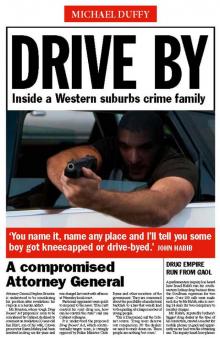 Drive By
Drive By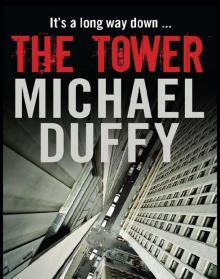 The Tower
The Tower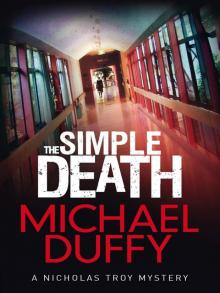 The Simple Death
The Simple Death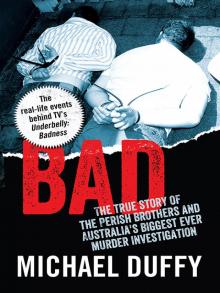 Bad
Bad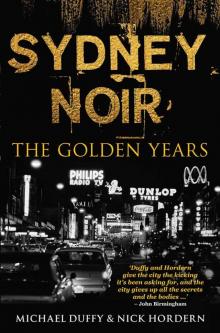 Sydney Noir
Sydney Noir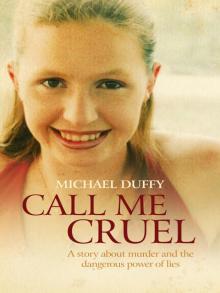 Call Me Cruel
Call Me Cruel